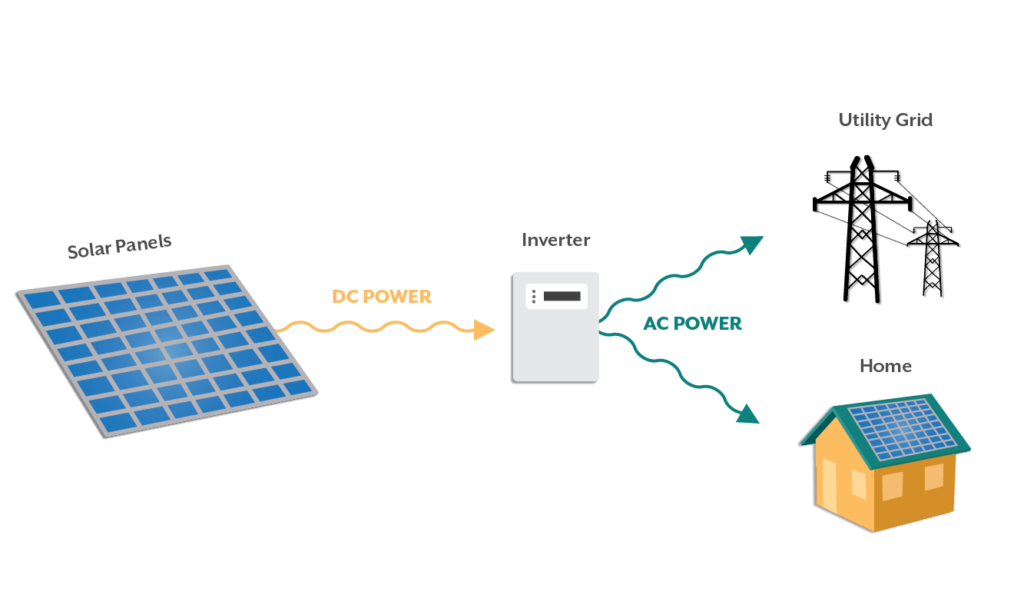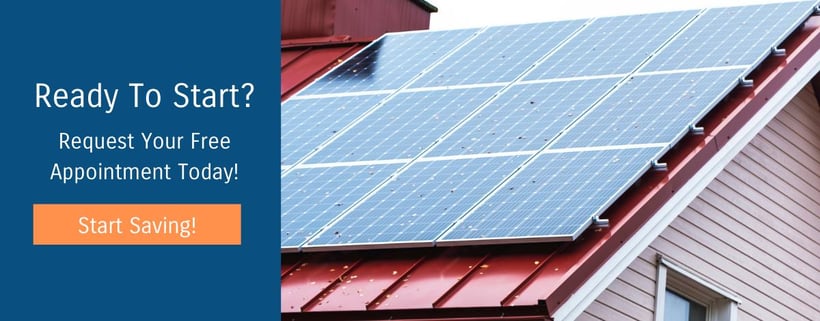How Does Solar Energy Save Money?
Unless you’re an engineer, you might not understand how your energy bill is formed, what’s included, and — most confusingly of all — why the charges listed are so different from month to month. It’s almost as if the electricity providers want to keep you in the dark.
Solar is different. Not only can we save money on your monthly bills, but we can explain them. We can show — in basic terms — how solar works and how charges are calculated. So, how does solar help you save?
How Solar Systems Produce Electricity

Let’s start with the basics: how does solar actually produce electricity?
Solar panels are made of silicon photovoltaic cells, electrical devices that convert light energy directly into electricity. When exposed to sunlight, these cells absorb and convert solar energy into direct current (DC) electricity. Next, the solar inverter converts the DC electricity into alternating current (AC) electricity which can be used to power your home.
So far so good. But you didn’t come here to read about photovoltaics. So let’s get to the point: how does solar help you save money on electricity?
Saving Money With Solar
There are many different ways to save money by going solar. The exact process and savings you’ll see will depend on whether you decide to purchase your solar panels outright or lease them through PosiGen’s solar leasing program.
Let’s take a look at some of the ways you could save with solar:
Renewable Energy Incentives
To help decrease carbon emissions and protect the environment, state and federal authorities offer incentives to people who switch to renewable energy sources. Different types of incentives are available to homeowners who purchase solar panels. Additionally, some states offer solar rebate programs: they refund the percentage of your solar project costs.
Many local authorities offer incentives, too. Connecticut Green Bank, for example, covers a fraction of the PosiGen Solar Program for homeowners.
It’s important to note that these incentives are intended for homeowners who purchase their panels rather than leasing them, so the incentives you can take direct advantage of may vary depending on how you go solar. But even without any subsidies, solar panels will still save you money. And that’s all thanks to net metering.
How Net Metering Works
Every home that has electricity also has a kilowatt meter. This is a device that measures, in kilowatts, how much electricity is consumed. Every month, the number of kilowatt-hours used (as measured by the meter) is multiplied by the price of electricity per kilowatt to calculate your energy bill. Your provider may include additional charges, such as delivery or restoration fees. With this in mind, the formula for your energy bill looks like this:
number of kilowatts used x price per kilowatt + additional charges = your electricity bill
For homes that don’t produce any electricity on their own, this operation goes in one directionl. They have a simple meter that only needs to measure how much energy is delivered to the home by the provider. This is called gross metering.
Homes with solar, on the other hand, don’t just consume the electricity from the grid — they also produce electricity. They need to be able to calculate the net amount of electricity consumed, a formula that looks more like this:
(number of kilowatts used - kilowatts produced with solar) x price per kilowatt + additional charges = your new electricity bill
This way, the homeowner will be credited for the amount of electricity they produce on their own.
The amount of electricity produced by solar will vary from month to month. In most cases, solar will be able to cover some of the energy needs of the home and the rest of the electricity will be delivered from the grid. Thanks to net metering, the utility bill will be decreased for the value of electricity the home has produced on its own. If the panels were able to satisfy 30% of the home’s energy needs, your bill will be 30% lower.
Sometimes, the panels will produce more energy than the home will need. In that case, the extra energy will be fed back into to the grid, and the homeowner will be awarded credits for an equal amount of free electricity that can be used in the future.
This way, homeowners with solar can ensure a stable energy supply. If they produce excess energy during the sunny days, they will be able to pull it back from the grid during days with less sun exposure.
Additional Energy Efficiency Improvements
Looking for more ways to save money? When you work with PosiGen, we will also provide free energy efficiency improvements. With simple services such as sealing air leaks, we could save you between 5% and 30% of the monthly cost of electricity. On top of that, if your state or utility services offer efficiency services, we can provide those too. That means you’ll receive state, utility, and PosiGen efficiency services all in one simple visit!
What Does Your Utility Bill Look Like With Solar?
Now that we’ve covered the basics of how you can save money with solar, how does that affect that pesky electricity bill? The answer depends on whether you purchase or lease your solar panels.
If, however, you follow more than 15,000 U.S. homeowners who have already signed up for the PosiGen solar lease, you will receive two separate bills:
- The regular utility bill (minus costs for the solar energy you produce)
- Your monthly PosiGen bill with a fixed, non-escalating lease price
While you will receive two bills, the total amount you pay for electricity will be lower. This is so important to us that PosiGen will give you a written guarantee of how much money you will save with our program for the first year. How do we do it?
PosiGen’s engineers run a mathematical analysis for every home before we offer the solar program. We will only make the sale if we are certain you will save money. For example, if you enter a monthly $60 lease for your solar panels, we guarantee that you will save more than $60 on your electricity on average every month, allowing you to easily cover the cost of the lease.
And while the electricity providers increase the cost of electricity as the years go by, our lease program allows you to lock in your discounted rate for solar panels for 20 years. Imagine if you could ensure a gallon of gas for your car would cost the same 20 years from now as it does today! Fixed-rate, no surprises.
Want to Learn More?
We hope this post helped you get a better understanding of how solar helps homeowners save money.
No two homes are alike. Will solar work for yours? How much money could you save? How long would it take to install?
Reach out to us and to talk with one of our experts. You will get a detailed overview of how solar could work for you, and even if you decide not to move forward with us, you will have a better idea of the ways you can make your home more energy-efficient. We’re happy to help.

